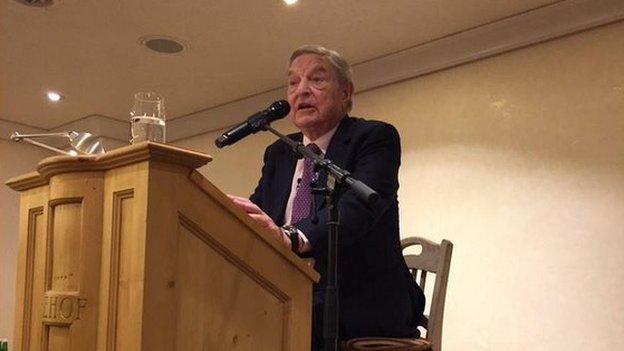Eurozone stimulus 'reinforces inequality', warns Soros
- Published

Mr Soros says he no longer manages his own money
Billionaire investor George Soros has warned that the aggressive stimulus policy rolled-out by the European Central Bank (ECB) could "reinforce inequality" in the EU.
The ECB committed to injecting at least €1.1 trillion (£834bn) into the ailing eurozone economy.
Mr Soros added that the measures could have "serious political repercussions".
But he emphasised that he expected the ECB's policy to drive economic growth in the European Union.
Speaking at a dinner at the World Economic Forum in Davos, the 84-year-old, who was born in Hungary, voiced concerns that an "excessive reliance on monetary policy tends to enrich the owners of property and at the same time will not relieve the downward pressure on wages."
Economic reform
The ECB's favoured method, known as quantitative easing, amounted to a "very powerful set of measures," said the financier, and had "exceeded the very high expectations of the markets."
However he twice cautioned that quantitative easing would "increase inequality between rich and poor, both in regards of the countries and people".
Asked if he worried that the newest round of quantitative easing, which essentially pumps more money into the eurozone, would lead some EU states to delay economic reforms, Mr Soros said that if there were growth, it would actually make it easier for countries like France to change their financial systems.
He also said there was another powerful way of boosting the Eurozone economy.
'This time it's final'
"There is one large untapped source of triple-A credit, and that is the European Union itself - that has practically no debt, but it has taxing power," he said, urging the EU to spend more on financing infrastructure projects, such as energy pipelines, electricity networks and even roads.
Mr Soros, who initially became famous for having made $1bn by betting on the devaluation of the pound sterling in 1992, spent the rest of the evening discussing political issues, particularly the crisis in Ukraine.
"I have finally retired from managing my own money," he said, adding:
"This time it's final".